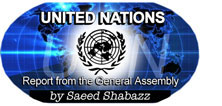By Saeed Shabazz-Staff Writer-

UNITED NATIONS (FinalCall.com) – Many leaders addressing the UN General Assembly during its 68th annual general debate warned if there is no improvement in conditions facing the world’s poor, they would look beyond the UN for solutions.
“We run the risk of citizens seeing their institutions, and also the United Nations, as something far removed from the everyday lives and real problems,” Andorra’s head of government Antoni Marti told the 193-member General Assembly.
President Ellen Johnson-Sirleaf of Liberia echoed that call when she told the General Assembly that African governments are already working toward an “African common position” on the post-2015 development agenda.
The theme for this year’s General Assembly debate was “The Post 2015 Development Agenda: Setting the Stage.” It was devoted to establishing a roadmap that would eliminate world poverty and its attendant ills in the decades after 2015, when current UN Millennium Development Goal deadlines end.
In 2000, world leaders adopted 8 anti-poverty goals, such as slashing extreme hunger and poverty, boosting access to health care and education, achieving gender equality and environmental stability, reduce maternal and child mortality and the incidence of HIV/AIDS by the end of 2015.
“Most of the Millennium targets will not be reached by their deadline,” noted the president of Andorra, one of Europe’s smallest nations with a population of 89,293 people comprised of Spanish, French, Portuguese and Andorran residents.
Prime Minister Kamla Persad-Bissessar of the Republic of Trinidad and Tobago and chairperson of the 14-nation Caribbean regional group said, “Current approaches will not advance the MDG agenda by 2015 or ensure sustainable development in the post-2015 context.”
The UN’s Food and Agriculture Organization reports there are 870 million hungry people in the world, 98 percent live in developing nations with three-fourths living in rural Asia and Africa. Fifty-three million people in Latin America and the Caribbean are classified as hungry by the FAO, while there are 19 million people hungry in the developed world.
Global Issues.org, reported in January that half the world’s population, 3 billion people, live on less than $2.50 a day and that at least 80 percent live on less than $10 a day.
According to UNICEF, 22,000 children die each day due to poverty, while 27-28 percent of all children in the developing nations are estimated to be underweight–most of them living in South Asia and sub-Saharan Africa.
African leaders stressed the way forward requires strong partnerships and adequate funding for new programs after 2015.
The 21st century can be an African century for development, said the chairperson of the African Union Prime Minister Hallemariam Dessalegn of Ethiopia. “We have every reason to be optimistic that an African renaissance is indeed around the corner,” he said. President Johnson-Sirleaf noted African “economic growth averaged over 5 percent surpassing other regions.”
Many leaders of Latin American nations argued there would be no success at achieving the MDGs by 2015 or beyond without a global push to promote justice and end inequality.
“When I look at the actions of the speakers espousing peace, democracy and social justice, and I see them involved in military intervention, blocking air-space and using espionage, I ask just what kind of peace and social justice are they talking about!” said President Evo Morales Ayma of Bolivia.
During the speeches, delegations from around the world met in the UN’s sub-basement hammering a roadmap to be voted on in 2014 at the 69th annual debate.












